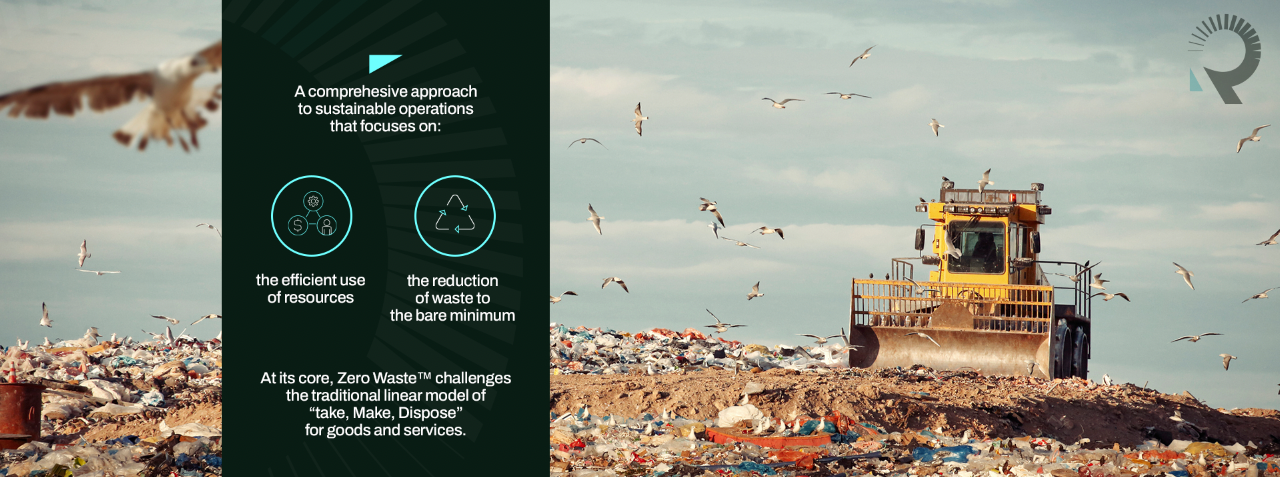In a world increasingly driven by sustainability and corporate responsibility, the concept of Zero Waste has emerged as a powerful force for change in the business landscape. Beyond its environmental merits, Zero Waste represents a strategic paradigm shift that has the potential to revolutionize the way organizations operate and thrive. The most critical dimension of a Zero Waste strategy that often resonates the most with businesses is the bottom line.
Beyond finances, the return on investment of Zero Waste to landfill initiatives includes increased operational efficiency, market volatility resilience and reduced impacts from future regulatory changes. Zero Waste is no longer simply a sustainable choice for industries. It has become a shrewd business strategy with the capability of protecting future profitability and ensuring greater affordability with waste management operations.
what is zero waste?
At its core, Zero Waste is a holistic approach to waste management that seeks to eliminate, minimize, and repurpose waste products to the greatest extent possible. The aim is to divert as much waste as possible from landfills and incineration, instead opting for recycling, composting, and reuse.

What is Zero Waste and what does it mean for your business?
the roi of zero waste: short term
One of the primary financial benefits of a Zero Waste strategy lies in the reduction of operational costs. In the short term, companies are able to directly cut expenses associated with waste disposal, landfill fees and waste collection services by beginning to actively minimize waste generation. Moreover, optimized material use and adopting more efficient manufacturing processes often leads to decreased production costs. These cost savings are immediate and can have a profound impact on a company’s bottom line. Additionally, businesses are able to quickly reduce waste through streamlining production processes, saving on energy and raw materials costs. Leveraging new technologies, such as AI-powered Waste Metering™, can also help in automating things such as near immediate data collection for optimized program efficiency and decision making.

Becoming a Zero Waste business is not just about cost-cutting; it also opens doors to new revenue streams. Companies that recycle their own materials or collaborate with recycling partners can generate income from the sale of recyclable materials. Additionally, implementing a Zero Waste strategy often necessitates businesses to innovate new ways of resource management. This has the potential to start yielding short term results in terms of new products and services, leading to expanding offerings for customers and positions to attract top talent.
Before teaming up with RoadRunner, a large manufacturing company was sending 100% of waste to landfills, spending nearly a quarter million dollars a year to do so. After performing a complete waste analysis, RoadRunner was able to implement a new staging system to organize waste by stream without impacting operations and enabling a path to zero waste to landfill. The result was an 88% increase in landfill diversion and, notably, 16% annual cost savings. Modern, innovative approaches to improve waste and recycling management can have a dramatic impact on affordability when working with RoadRunner.
long-term financial benefits of zero waste
While the immediate financial gains of adopting Zero Waste practices are compelling, the true power of this sustainable approach becomes evident when we consider its long-term impact. The results of continuous improvements, research, innovation and a commitment to sustainable best practices throughout a company allows the benefits of a Zero Waste strategy to continue to grow.
Compounding Efficiency And Operational Savings
Embracing a Zero Waste strategy compels businesses to invest in innovative solutions and cutting-edge research. By delving into sustainable materials, energy-efficient processes, and waste reduction technologies, companies pave the way for a greener, more efficient future. These innovations not only reduce environmental impact but also lead to substantial long-term operational efficiencies and significant cost savings.
Zero Waste isn't confined to end products; it encompasses the entire lifecycle of goods. Businesses embracing this strategy meticulously analyze each stage, identifying opportunities for waste reduction. By understanding the complete journey from raw material extraction to disposal, companies make informed decisions that lead to continuous operational improvements. This holistic approach not only enhances efficiency but also opens avenues for new revenue streams through sustainable product offerings.
The long-term benefits of Zero Waste extend to maintenance and disposal costs. As businesses produce less waste and implement more sustainable practices, maintenance and disposal costs decrease. Equipment longevity increases, and the need for costly waste disposal services diminishes. This not only contributes to cost savings but also helps maintain a healthier bottom line for years to come.
Resilience Against Waste Market Volatility
The cost of waste disposal can be unpredictable, with fees subject to change due to regulations and market dynamics. Companies practicing Zero Waste reduce their exposure to these unpredictable cost hikes. By diverting waste from landfills and incineration, they not only cut disposal costs but also insulate themselves from future price spikes in waste disposal services. If history is any indication, things like tipping fees, which have risen 133% in the last three decades, will only continue to increase.
For businesses, financial stability and predictable budgeting are paramount. Zero Waste strategies establish a culture of long-term sustainability within businesses which allows the predictability of costs to extend over the long term. Consistently reducing, reusing and recycling permits a company to continually insulate itself from future cost hikes, ensuring financial and budgetary stability.
In essence, the shift towards Zero Waste is not just an environmental decision but a strategic financial one when it comes to operational waste and recycling management.
Competitive Advantage And Market Positioning
Consumers today are increasingly inclined to support businesses that prioritize sustainability. Companies committed to Zero Waste resonate with environmentally conscious consumers, creating a loyal customer base. This not only bolsters current sales but also positions the business for long-term success by aligning with evolving consumer values. One recent study found nearly 40% of customers chose sustainable products to help the environment while another reported more than a third of consumers worldwide are willing to pay more for sustainability.
Zero Waste is not just a trend; it’s a long-term strategy that showcases a company’s dedication to environmental stewardship. Businesses that consistently reduce waste and embrace sustainable practices position themselves as market leaders. Over time, this leadership translates into an appreciated brand value, fostering trust and loyalty among customers and stakeholders.
How to set, achieve, and benefit from challenging diversion goals
looking beyond financial metrics: Long-term advantages
Zero Waste initiatives are instrumental in reducing a company’s carbon footprint. By minimizing waste generation, businesses decrease the need for resource-intensive production processes and waste disposal methods, ultimately leading to lower greenhouse gas emissions. Over time, these efforts contribute to a cleaner, more sustainable environment while aligning with global efforts to combat climate change.
Embracing Zero Waste inherently promotes the preservation of natural resources. By adopting practices such as recycling, reusing, and repurposing, companies reduce their reliance on finite resources. This conservation effort ensures a more sustainable supply chain and safeguards valuable resources for future generations.
Zero Waste is a cornerstone of corporate social responsibility (CSR). Companies that prioritize Zero Waste showcase their dedication to ethical business practices. This commitment extends beyond short-term profitability, positioning the company as a responsible corporate citizen with a genuine concern for the well-being of the planet and its inhabitants.
A commitment such as Zero Waste to landfill also provides a potential ESG boost for many businesses. The environmental metrics associated with Zero Waste, including reduced waste generation, increased landfill diversion and cuts to GHG emissions, provide a measurable indicator of a company’s commitment to sustainability. Quantifying the impacts and integrating the data into comprehensive reports can provide a major logistical and informational challenge. RoadRunner’s science-backed ESG reporting and team of TRUE Zero Waste Advisors can help streamline the implementation and reporting process through setting an in-depth sustainability reporting framework that makes sense for your business, collecting reliable data through leveraging smart technology and consolidating the information into easy to understand reports. RoadRunner can set a roadmap for your business to better achieve Zero Waste to landfill and carbon emissions reductions.
Read more about RoadRunner's sustainability offerings for your business!
long-term resource and regulatory risk mitigation
Zero Waste plays a pivotal role in supply chain sustainability. By optimizing resource usage and reducing waste, businesses become less reliant on external resources and suppliers. This heightened self-sufficiency acts as a buffer against disruptions in the supply chain, ensuring business continuity even in turbulent times. It's a proactive strategy that mitigates risks associated with resource scarcity and supply chain vulnerabilities.
Regulations surrounding environmental practices and waste management are constantly evolving. Businesses that embrace Zero Waste position themselves to adapt to these changes more seamlessly. By preemptively reducing waste and embracing eco-friendly practices, they decrease their vulnerability to future regulatory shifts, avoiding potential fines and operational interruptions.
the true power of zero waste
The business case for Zero Waste is compelling not only for its immediate financial returns but also for the enduring, long-term benefits it affords. While the short-term ROI of waste reduction and resource efficiency is evident in cost savings and revenue generation, the true power of Zero Waste lies in its ability to shape a business's future. By embracing sustainability, companies can bolster efficiency, reduce risks, and strengthen their market position. Moreover, they can contribute to a healthier planet, attract customers who value responsible practices and cultivate a dedicated and motivated workforce.
In a rapidly changing world, Zero Waste is more than just a strategy; it's a visionary investment in a sustainable, prosperous and resilient future for both business and society. As organizations increasingly recognize the economic and ecological wisdom of Zero Waste, the journey toward a waste-free world is poised to redefine the landscape of commerce, offering not only profitability but also a legacy of responsible stewardship for generations to come.
Find RoadRunner on Facebook, Twitter, Instagram, and LinkedIn!
